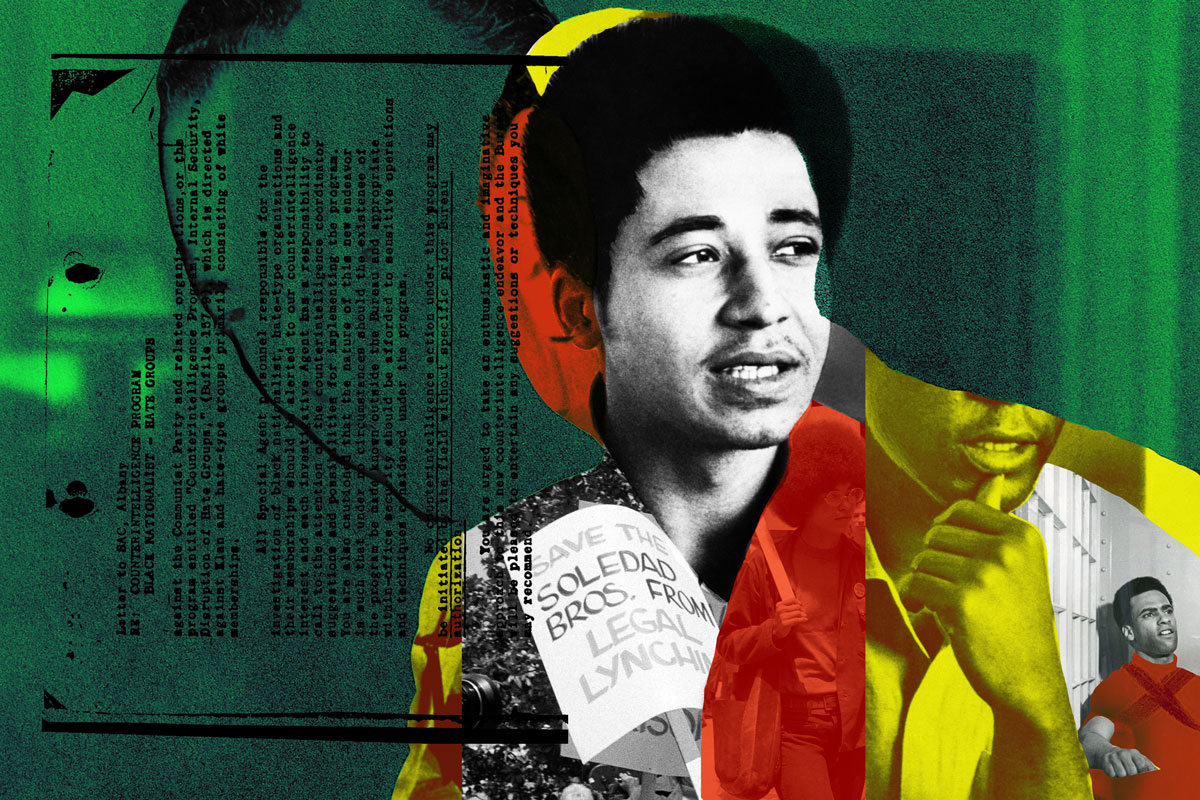I have always understood my home, the San Francisco Bay Area, to be the epicenter of youth activism and Black radicalism. After all, the Black Panther Party and Black Studies were borne out of struggles in that space and place. As I grew up during the 90s, I saw the legacies of the postwar movements (i.e. Black Power, Asian American, American Indian, and Anti-war movements) memorialized in murals and graffiti projects that animated and politicized highway overpasses and buildings. I vividly remember sitting in the backseat of my mother’s Nissan Sentra one day and asking her, “who is Leonard?” It seemed like a sign reading “FREE LEONARD” had been in the same place, visible to all that traveled along Interstate 80 and around Berkeley, for decades. Leonard Peltier—Native American activist, member of the American Indian Movement (AIM), and political prisoner—has been unjustly incarcerated for over 45 years. The walls of People’s Park and Marcus Bookstore (the nation’s oldest Black-owned bookstore) have all likewise been important physical sites of remembrance, uplifting the names, images, and works of political prisoners like Peltier, Dr. Mutulu Shakur, Mumia Abu-Jamal, George Jackson, Sundiata Acoli, Assata Shakur, and Geronimo Pratt.
This year marks the 43rd annual observance of Black August—a month-long commemoration of freedom fighters and political prisoners. It is an intentional time for study and reflection on Black liberation, to condemn how anti-Blackness and adversely affects Black folks’ material conditions, to demand the release of all political prisoners and an end to mass incarceration and surveillance, and to emphasize the importance of getting involved in the shared pursuit of Black liberation. (Ironically, many of the calls to action made by political prisoners and those who carry the torch of Black August now echo, in distinctly distorted and self-serving fashion, in the anti-law enforcement rhetoric right-wing figures have taken up in response to the recent FBI raid of former President Donald Trump’s Mar-a-Lago residence.)
As Black August reminds us, calls for the dissolution or defunding of the FBI and critiques of law enforcement and the unjust application of the law are not new; the roots of this discourse can be traced back to the political prisoners movement and the Black radical tradition overall. There is much Black August can teach us all in this political moment.
George Jackson defined fascism as “a police state wherein the political ascendency is tied into and protects the interests of the upper class—characterized by militarism, racism . . . and concedes further that criminals and crime arise from material, economic, sociopolitical causes.”
Yes, this tradition affirms: defund the FBI—not for reactionary neo-fascist Trumpian politics, but as one of many steps that this nation needs to take to atone for more than a century of fascist governance and policing spearheaded by the bureau. Not long before Black August was first launched, former FBI Director J. Edgar Hoover was conducting the infamous Counter Intelligence Program (or COINTELPRO)—which resulted in many Black leaders and activists (as well as Native American and Latine activists) from Rev. Dr. Martin Luther King Jr. to Peltier being unjustly surveilled, incarcerated, tortured and (in many instances) killed. Local police programs adopted the same model of antidemocratic surveillance and infiltration, and continue to suppress dissent in this authoritarian manner to this day.
If we are genuinely invested in the creation and/or maintenance of a true American democracy, we must all reckon with the reality that the FBI has operated in a fashion antithetical to any conception of democracy, often infringing upon the civil, human, and political rights of Americans.
At its core, Black August honors the life of George Jackson. The commemoration began in 1979 among Black political prisoners and members of the Black Guerilla Family at San Quentin State Prison, California’s oldest prison, infamously known for housing male Death Row inmates. In 1961, the then-19-year-old Jackson was convicted of armed robbery of a gas station in 1961 and stealing $70. He received an indeterminate sentence of “one year to life” in prison—meaning that the state gave him no concrete date for release. Jackson spent his time in prison studying the works of communist and Pan-African writers, and he was very much influenced by the engaged and direct activism of the Black Panther Party and Black Power movement.
He became a “prison prophet”—providing a pioneering early analysis of mass incarceration and what legal scholar Michelle Alexander would eventually coin the “new Jim Crow.” Jackson decried the inhumane and unethical conditions of prisons—and notably highlighted how the government was employing mass incarceration as a tool to destabilize Black neighborhoods and repress radical movements with the aim of “complete destruction of all revolutionary consciousness.” Here, Jackson was arguably a prophet in the strict sense of the term, since this initiative has in many ways succeeded in our own neoliberal age of mass incarceration. Jackson also understood that mass incarceration was but one among several modes of repression in the American fascist toolbox. Jackson defined fascism as “a police state wherein the political ascendency is tied into and protects the interests of the upper class—characterized by militarism, racism . . . and concedes further that criminals and crime arise from material, economic, sociopolitical causes.” George Jackson. Soledad Brother: The Prison Letters of George Jackson, pg 18.
With various levels of law enforcement exercising authoritarian-style techniques to quell the civil rights, Black Power, and antiwar movements, Jackson, like Huey P. Newton, Angela Davis, and Robert F. Williams, deduced that the U.S. government’s relationship to Black people was always rooted in fascism. These thinkers all cited the devastating and ongiong legacies of racial discrimination and white supremacist terror: the dual application of the law across the racial divide, genocide (vis-a-vis slavery, lynchings, mass incarceration, and state-sanctioned violence), and the racially exploitative nature of modern capitalism—the nation’s all-influencing economic foundation.
By 1970, Davis, Newton, and Ericka Huggins—a Black Panther Party leader—were all incarcerated or recently released from prison on mostly trumped up charges stemming from or otherwise supported by illegal FBI investigations. During their imprisonment, they urgently called for an antifascist organizing strategy and politics, prompting the creation of the 1969 Black Panther Party’s United Front Against Fascism conference and Intercommunal Committees to Combat Fascism. (committees that functioned as multiracial Black Panther Party chapters that primarily focused on “survival programs”) and the seeds of the prison abolition movement.
In 1971, Jackson was killed while trying to escape San Quentin after serving out 11 years of his indeterminate prison sentence—eight of them in solitary confinement, which is an act of torture and has been demonstrated to cause long-lasting harm to a person’s mind and body. Throughout the rest of the 1970s, dozens of Black activists affiliated with the Black Panther Party, Black Liberation Army, MOVE, and other organizations would continue to be subjected to highly contested charges, unfairly tried in the courts, and incarcerated for their political, often Black antifascist, organizing.
Without substantive and transformative action against fascistic law enforcement practices and powers, history is repeating itself.
Jackson’s Black antifascist legacy is best chronicled in his two books, Blood in My Eye and Soledad Brother. Especially today, both works remain relevant cautionary tales about the dangers of American fascism. They sound this alarm—not just for those taken captive as political prisoners, but for everyday citizens living under an ever-growing police state where even the illusion of democracy seems out of reach, as laws and our highest courts are being written and reconstituted to advance the latest and seemingly most audacious stage of American fascism that won’t stop at just Black radicals.
Every time I get a chance to go back to my beloved Oakland, I make sure to look for that “Free Leonard” sign along the highway and other political art memorializing freedom fighters. They are looming reminders that political prisoners are not just something out of the past, but real people who are alive today sequestered in prisons across this country. Unfortunately, but not surprisingly, there’s a new generation of political prisoners emerging in response to police and FBI crackdowns on activists and leaders of the Ferguson uprising and 2020 #blacklivesmatter protests—#freejoshwilliams and #freeallpoliticalprisoners. Without substantive and transformative action against fascistic law enforcement practices and powers, history is repeating itself.
This Black August, I encourage us all to take heed of George Jackson’s words: “to seize the power for the people and relegate fascism to the history books, the vanguard must change the basic patterns of thought. We are going to have to study the principles of people’s movements. We are going to have to study them where they took place and interpret them to fit our situation.” George Jackson. Soledad Brother: The Prison Letters of George Jackson, pg 226.While Jackson found inspiration and strategy from studying liberation movements of his day fighting for power in parts of Africa and the anti-imperial successes in Vietnam and Cuba, there is much we can learn from the history of Black August and the political prisoners in today’s American carceral state to resist the latest phase of American fascism.
A Black August and Black Antifascist Reading List
- Blood in My Eye by George Jackson
- Soledad Brother: The Prison Letters of George Jackson by George Jackson
- Are Prisons Obsolete? by Angela Davis
- Message to the Black Movement: A Political Statement from the Black Underground by the Coordinating Committee Black Liberation Army
- Resisting State Violence: Radicalism, Gender, and Race in U.S. Culture by Joy James
- Angela Davis: An Autobiography by Angela Davis
- Negroes with Guns by Robert F. Williams
- Revolutionary Suicide by Huey P. Newton
- Live from Death Row by Mumia Abu-Jamal
- Assata: An Autobiography by Assata Shakur
- If They Come in The Morning by Angela Davis and Other Political Prisoners
- Arrested Justice: Black Women, Violence, and America’s Prison Nation by Beth E. Richie
- The Criminalization of LGBT People in the United States by Andrea Ritchie, Joey L. Mogul, and Kay Whitlock
- Captive Genders: Trans Embodiment and the Prison Industrial Complex by Nat Smith, Eric A. Stanley, and CeCeMcDonald
- Golden Gulag Prisons, Surplus, Crisis, and Opposition in Globalizing by Ruth Wilson Gilmore
Jeanelle K. Hope, Ph.D. is a cultural critic and scholar of Black studies, focusing on social and cultural movements, political thought, Black girlhood and Black representation in media. She is co-author of the forthcoming book, The Black Anti Fascist Tradition (Haymarket Books).



